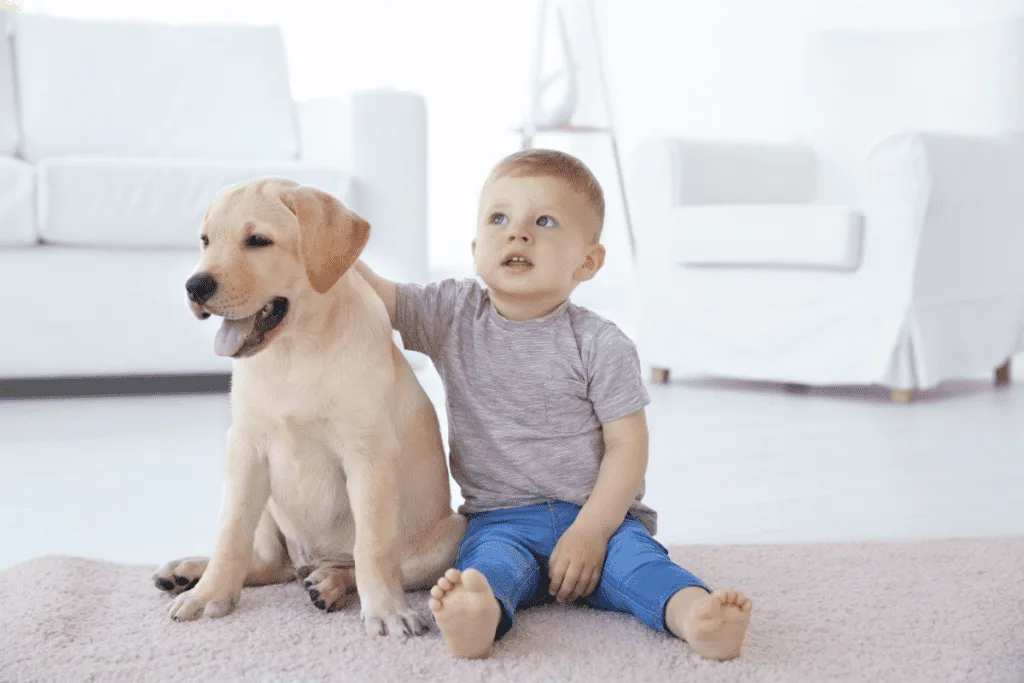Small babies and large dogs, like the Labrador, rarely seem like a good mix. Many people are pleasantly surprised to discover that most Labradors are better baby companions than many small dog breeds.
Most responsibly bred and correctly handled Labradors are good with small babies. However, individual Labradors will bite in certain situations; thus, it is crucial to know your dog. Middle-aged Labradors with the ideal AKC Labrador temperament are the best dog companions for small babies.
Dog bites can cause significant injury to babies and small children, and thus it is essential to choose a breed known for its baby-friendly ways.
Although it’s crucial to consider a Labrador’s compatibility with small babies, it is equally important to ascertain their tolerance for toddlers and children. Your baby won’t stay a baby forever!

Click Here to Jump to a Section
Is The Ideal Labrador Temperament Compatible With Babies?
The ideal Labrador is characterized by a goofy, sweet, and affectionate nature. Labradors adore people, and most well-bred Labradors LOVE children.
Labradors are such people-orientated dogs that few Labradors thrive when left to live outdoors away from their beloved family.
Labradors should be calm, confident, stable dogs. A stable, well-balanced dog is gregarious and laid-back, not prone to extreme anxiety or aggression.
In summary, a confident, well-bred Labrador is an excellent baby companion and childhood friend.
Baby-Incompatible Labrador Behaviour
Labradors may seem like the ideal family dog, and in many ways, they are, but it is essential to remember that a Labrador may not be the perfect dog for your family.
This breed is notorious for its exuberantly, bouncy Tigger-like approach to life.
Labradors are high-energy dogs that live life at full throttle; not every family is equipped to handle a young Labrador’s bubbly enthusiasm for life.
A young Labrador may accidentally bump and knock over small children during their wild games.
While the consequences of the Labrador’s rambunctious play are unintentional, babies and toddlers are often frightened by the experience.
The good news is this behavior is manageable, and many Labradors naturally calm down between 2yrs to 3yrs old.
Labradors would not be the preferred service dog for the visually impaired if they didn’t learn to manage their high-energy approach to life.
(Sources: AKC; Guide Dogs)
Do Labradors Bite Children And Babies?
A talented field Labrador should have a butter soft mouth and good bite inhibition, i.e., regulate their bite strength.
Despite the Labradors’ reputation for a soft mouth, they are one of the most common offenders of pediatric dog bites.
(Sources: University of Idaho; AKC; Journal of Plastic Surgery)
Labrador Paediatric Bite Statistics
- 50% to 68% of dog bites occurred in children younger than 5yrs of age
- 53.2% of pediatric dog bites were provoked
- 7.0% to 13.7% of pediatric bites were due to Labradors
(Source: Journal of Craniomaxillofacial Trauma & Reconstruction; Journal of Plastic Surgery)
Why Do So Many Labradors Bite Children?
There are a few hypotheses that may reasonably explain the prevalence of Labrador-linked pediatric dog bites:
- Labradors are popular; the more Labradors, the higher the chance they will be involved in child-directed aggression
- The Labrador was provoked by the child’s or other family member’s actions
- The bite was an accident, e.g., a child tried to separate fighting dogs
- An irresponsibly bred Labrador will often display increased aggression and anxiety
- The Labrador has been mishandled, causing excessive anxiety and aggression
- The Labrador is in pain and acted defensively
(Source: Newcastle University; Smithsonian Magazine; VCA Animal Hospital; AKC; Journal of Craniomaxillofacial Trauma & Reconstruction)
Know Your Labrador

You know your Labrador better than anyone else, and this knowledge will allow you to predict the potential bite risk your Labrador may pose.
Older Labradors are often arthritic and struggle with mobility. Chronic pain can make anyone grumpy, and this is also true for your Labrador.
While an arthritic Labrador is unlikely to pose a danger to your baby, they may growl and even snap in pain if a clumsy toddler falls onto them.
Labradors with atypical levels of aggression and anxiety are often a product of bad handling or irresponsible breeding.
Signs that your Labrador is a bite risk include:
- Anxious behavior, e.g., crouching, lowering the head, tucking the tail between its legs, attempting to move away.
- Resource guarding, e.g., growling and snapping when people approach his food, person, or any other item your Labrador considers his
- Defensive behavior when being handled or touched, e.g., anxiety-linked behaviors, growling, snapping, or biting
If you are uncertain about your Labradors’ reliability with your baby and toddler, it is helpful to contact a vet-recommended dog trainer or animal behaviorist.
A professional animal behaviorist will be able to help assess the bite risk your Labrador poses.
(Source: PetMD; Newcastle University; Smithsonian Magazine; VCA Animal Hospital; AKC )
Which Is Better With Babies, Older Or Younger Labradors?
The age of your Labrador will influence how they interact with babies and toddlers. The different life stages of a Labrador come with distinct advantages and disadvantages for families with small children.
Young Labradors: 0yrs to 2yrs
Pros
- You can ensure your Labrador has positive interactions with children
- You can teach your Labrador to behave politely around children
- Your Labrador will enjoy playing with young children
Cons
- They are exuberant and may knock little children over.
- Young Labradors love to play bite and need to be taught not to do this.
- New parents may not have the resources to deal with a high-energy Labrador and new baby.
Middle-Aged Labradors: 2yrs to 8yrs
Pros
- They are quieter and hopefully already well-mannered
- They are happy to play gently with children
- Your Labrador has many years ahead of him to be your child’s playmate.
Cons
- If your Labrador is adopted from a shelter, you won’t know if their previous interactions with babies and children were negative or positive.
Senior Labradors: 8yrs and older
Pros
- They are happy to spend long hours dozing in the nursery without disturbing the busy new parents.
- They are settled in their routine and don’t require constant supervision.
Cons
- They may be reluctant to play with the children.
- They may become arthritic and grumpy.
Facilitating Positive Interactions Between Labrador And Baby
Many new parents are walking balls of nerves, their protective instincts are in hyperdrive, and they embrace the mother-bear attitude.
Facilitating a positive interaction between your baby and Labrador starts with regulating your emotions and inner thoughts regarding the meeting.
Anxious parents can “transfer” their anxiety to their baby and Labrador. An anxious Labrador and baby meeting for the first time are unlikely to enjoy the experience!
Before introducing your Labrador to your baby, make sure you are entering the situation feeling calm and confident about achieving a positive outcome.
(Source: Journal Of Veterinary Behavior; Western Australia Department of Health)
How To Introduce Your Labrador To Your Baby
Denise Flaim wrote a brilliant article for the AKC on how to introduce your Labrador to your new baby.
As a professional breeder and mother of triplets, she is more than qualified to give insightful advice on how to navigate the introduction between your Labrador and baby!
The three key points to remember are:
- Don’t force the introduction; give your Labrador space, mentally and physically, to become comfortable with their tiny new family member
- Don’t be disappointed if your Labrador needs a period of adjustment
- Reward your Labrador for behaving calmly and politely around your baby
Final Thoughts
Most Labradors will happily accept a small baby into their family; however, it is essential to know your dog and respect their individuality. Not all Labradors are comfortable around children and may bite in certain situations.
